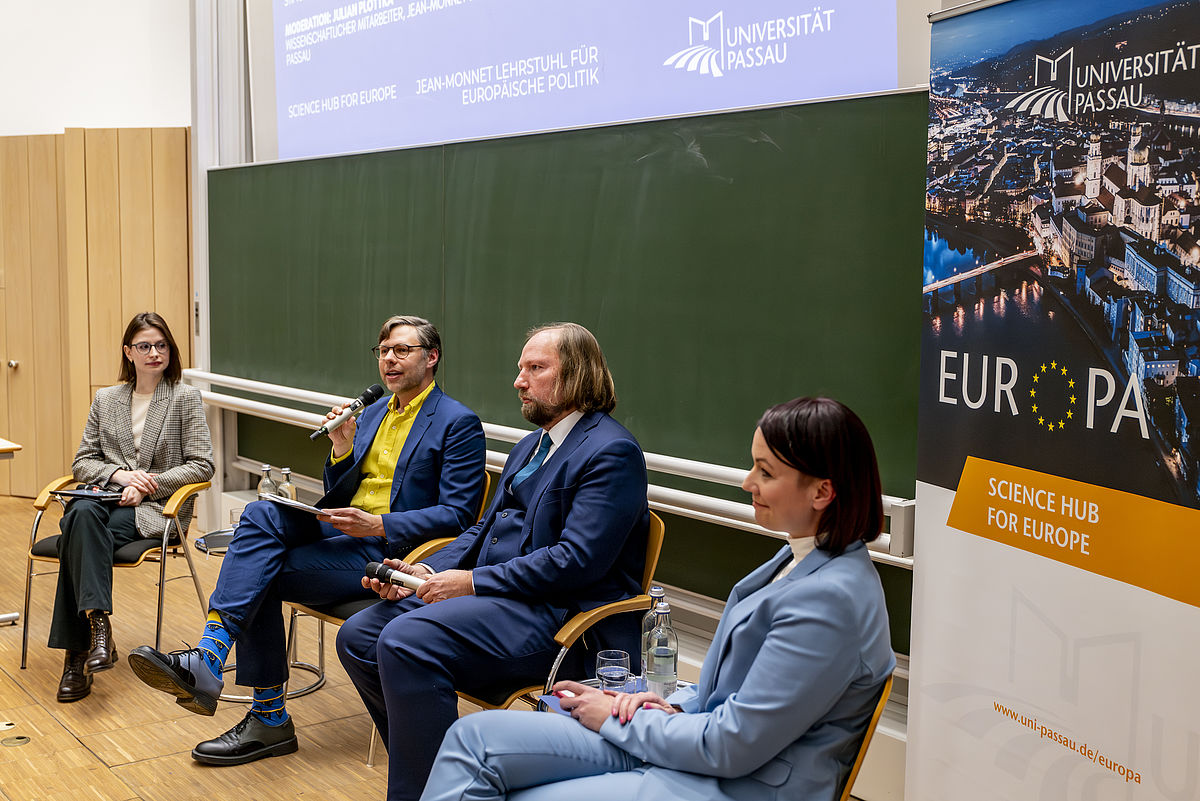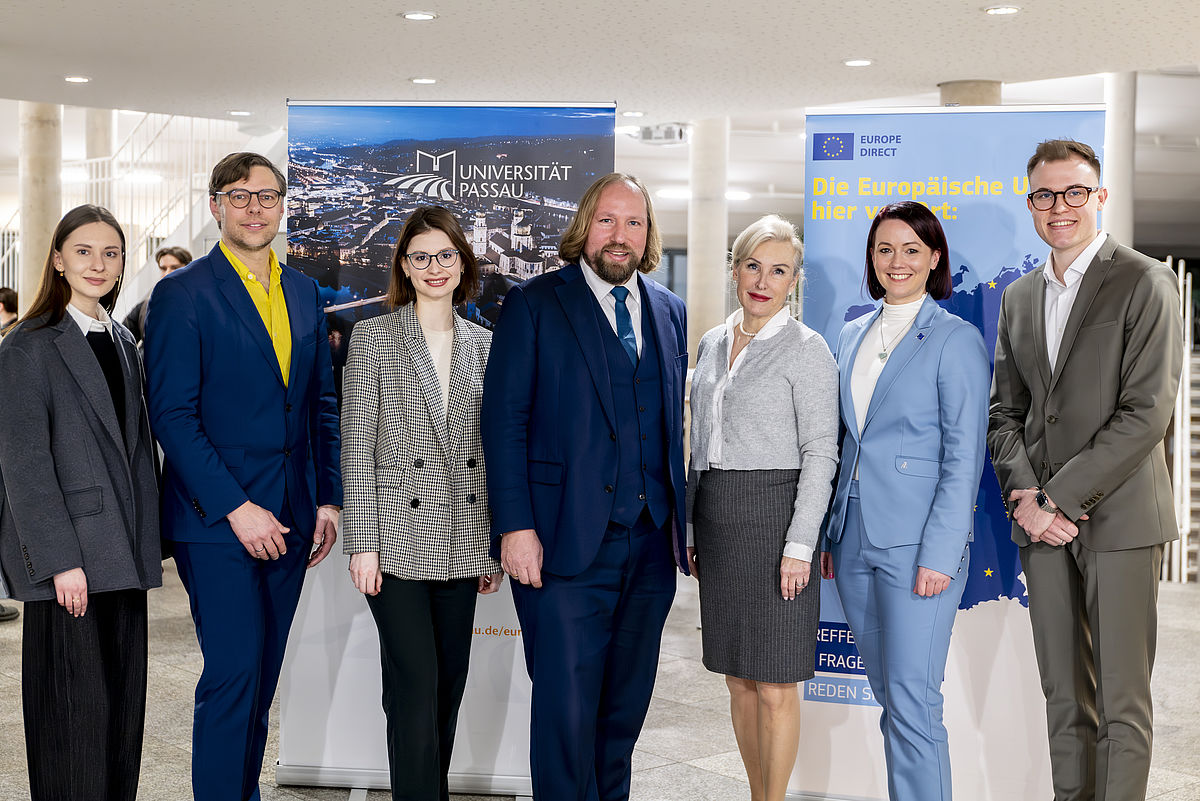Two days after Donald Trump was sworn in as the 47th President of the United States of America, the "Round Table on EU Foreign Policy" took place on 22 January 2025. Dr Anton Hofreiter, Member of the German Bundestag and Chairman of the EU Affairs Committee, Florence Ertel, Managing Director of the Science Hub for Europe at the University of Passau and Martina Beránková, Research Associate at the Konrad Adenauer Foundation's international office in Prague discussed the consequences of Trumps second term in office for the European Union's security and defence policy from German, French an Czech perspectives.
The event entitled "Trump 2.0: Really a wake-up call for the EU's security and defence policy?" (organised by Julian Plottka for the Jean Monnet Chair of European Politics and Florence Ertel for the Science Hub for Europe) aimed to critically contrast the German view of the current debate with the French and Czech perspectives. It also offered an insight into the University of Passaus research on the Common Security and Defence Policy (CSDP) for the more than 250 participants who had accepted the invitation. In her welcoming address, Professor Christina Hansen, Vice President for International Affairs, Europe and Diversity at the University of Passau, emphasised the importance of the focus on Europe for the entire university. This offers public space for discussion for all interested parties and a practice-orientated enrichment of university teaching for the numerous students in the audience.
National governments are the brakes on the CSDP

Moderator Julian Plottka (second from left) with the panellists Martina Beránková, Anton Hofreiter and Florence Ertel.
Moderator Plottka opened the panel discussion by asking Hofreiter whether any solutions were now being discussed in Brussels on how to achieve the much-demanded strengthening of the CSDP. According to Hofreiter, there is no comprehensive answer to this yet, but "the problem is not so much Brussels, but the capital cities". They were struggling to act adequately, especially Germany, from which a leadership role, but failesto fulfil it. The Germans "always act as if we were Austria, but we are simply not Austria".
"An agile, strong, capable Europe is a major factor for Prague", said Beránková, explaining the Czech government's expectations of future European security and defence policy. There is certainly hope that the pressure exerted on the European partner states by the new Trump administration could help to overcome the hurdles described by Hofreiter. Ertel explained that French President Emmanuel Macron no longer shares his earlier diagnosis of NATO being brain dead in light of the Russian war of aggression against Ukraine and the geopolitical consequences for the EU. However, he continued to emphasise that the EU must have a strong security and defence policy that is independent of NATO.
No expectations of Trump, disappointed expectations of Biden
Expectations of the new Trump administration are not extremely high in all three countries. The only positive aspect is the possible shock that could go through the European capitals in view of the impending end of US support for Europe. According to Ertel, this particularly fuelled the French demand for strategic sovereignty of the EU. France's expectations of the USA have always been cautious, while the relationship between Macron and Trump was ambivalent during the latter's first term in office. At present, the French president can be seen to be endeavouring to maintain good diplomatic relations with Trump and presenting himself as a key figure in EU-US relations.
Both Hofreiter and Beránková were also critical in their assessment of Joe Biden's presidency. Even if the atmosphere in transatlantic relations was better than it will be in the next four years, the aid for Ukraine fell well short of US expectations and capabilities. Hofreiter explained how reluctant the Biden administration was to approve arms shipments, even though the US army had sufficient reserves.
High expectations for the EU High Representative for Foreign Affairs and the new EU Commissioner for Defence
In response to Plottka's question as to whether the European Commission could initiate positive developments, Hofreiter emphasised how capable the new Commissioner for Defence Andrius Kubilius and the new EU High Representative for Foreign Affairs Kaja Kallas were. He hoped that the EU would act more strategically, especially towards Russia: "In the short term, Russia is the greatest challenge to our security, in the long-term China". However, Brussels does not have sufficient financial resources for the necessary investments in European security. Although the member states have these funds, they are not prepared to invest more.
Ertel explained that France primarily wanted to support and protect its strong defence industry in the debate. At the same time, the French government favours an intergovernmental European defence policy in the Gaullist tradition in order to "assert European interests in the national sense". A supranationalisation of European security and defence policy is rejected in Paris due to fears of a loss of influence.
According to Beránková, the Czech government is also sceptical about a supranational solution in the CSDP. Its introduction would first require unanimity and Hungarian Prime Minister Victor Orbán in particular was threatening to block it. Prague's goal is to support Ukraine as quickly and comprehensively as possible, which is why the Czech Republic is "open to a pragmatic solution". At the same time, there is hope that the EU will also be a strong partner in the domestic market, enabling Czech defence companies to establish themselves.
More open to the views of other Member States
Regardless of the path to be taken to strengthen European security and defence policy - whether supranational or intergovernmental - the goal can currently only be achieved with the consensus of all member states. This requires a better mutual understanding of the different national perspectives. While many member states, such as the Czech Republic, closely follow the German discussions, the security policy debate in Germany is often ignorant of the interests and perspectives of partner states. This must change if the next German government wants to successfully pursue European policy. This also requires more dialogue formats, such as the "Round Table on EU Foreign Policy".
Text: Pia Stock
This text was machine-translated from German.

The organising team with the panel participants (from left): Kateryna Pivnenko and Julian Plottka from the Jean Monnet Chair for European Politics, Martina Beránková from the Konrad Adenauer Foundation in Prague, Dr Anton Hofreiter, Chairman of the EU Affairs Committee, Professor Christina Hansen, Vice President for International Affairs and Diversity, Florence Ertel and Jan Keusemann from the Science Hub for Europe.









